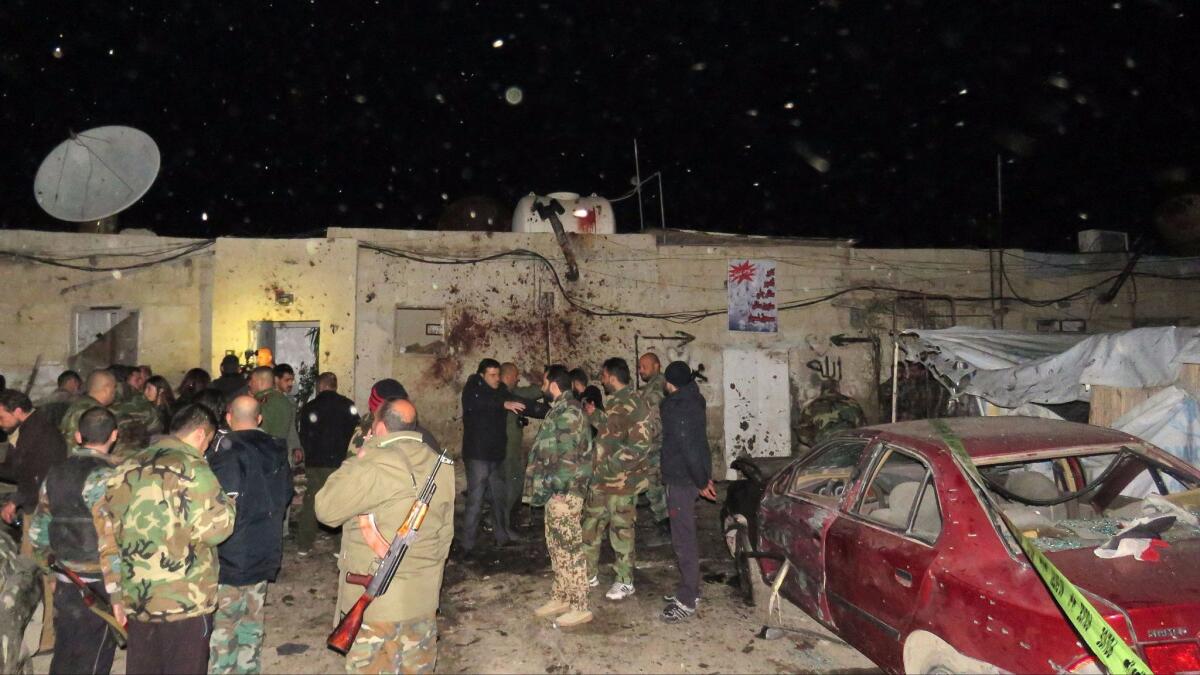Syria says Israeli strikes hit near airport west of capital, warns of repercussions

- Share via
Reporting from Beirut — Syrian officials said Israeli missiles slammed into a military airport near Damascus early Friday, and warned of repercussions for what they called flagrant aggression.
Several missiles were fired about 12:25 a.m. from an area close to Lake Tiberias in Israel and exploded near the Mezzeh military airport, causing a fire, according to the official Syrian Arab News Agency, or SANA. There were no immediate reports of casualties.
Syria said Israel was assisting terrorist groups fighting the government.
“The General Command of the army and the armed forces warns the Israeli enemy from the repercussions of this flagrant aggression and confirms its battle against terrorism,” the SANA statement said.
Syria’s Foreign Ministry issued a statement saying attacks by Israel against Syria coincided with defeats by opposition fighters in the country’s nearly six-year civil war.
“The new aggression comes after the great loss of the terrorist Nusra Front and its allies in east Aleppo” and other areas of the country, the statement said.
Al Nusra Front is the former name of the Front for the Conquest of Syria. The group was until recently affiliated with Al Qaeda, and the U.S. has targeted dozens of its leaders in Syria’s northern province of Idlib and elsewhere.
It also said Israel had supplied weapons to “its terrorist allies,” especially Al Nusra Front.
A spokeswoman for the Israeli Defense Forces declined to confirm or deny the reports of an Israeli strike.
Video uploaded by activists on social media showed large explosions flaring in the night sky near what was said to be the Mezzeh airport, which is approximately 6 miles west of Damascus’ center and is used mostly by Syria’s elite Republican Guard as well as Special Forces units.
Another video from pro-government news outlet Masdar News depicted flashes of light as the booms of explosions set windows miles away rattling.
Danny Makki, a Britain-based Syrian journalist and commentator currently in Damascus, said in a tweet there had been eight “consecutive loud bangs.”
Makki said later in an interview via social media the fires in the airport could be seen clearly from a distance and “kept on raging for hours.”
“Everyone in the capital heard the [explosions],” Makki said. “It was different to regular shelling or anything outgoing from the [Syrian] military.”
An unofficial social media channel affiliated with Hmeymim air base, the headquarters of Russia’s forces in Syria, said the attack had been conducted using F-35 warplanes. Israel received a shipment of the stealth fighters from the U.S. in December. Israeli military planners have said the aircraft is capable of evading Russia’s S-400 and S-300 advanced missile-defense systems, which were deployed in Syria over the last year, according to the Jerusalem Post.
Russia has been a key supporter of Syrian President Bashar Assad’s government, while the U.S. has called for Assad to step down.
The bombing is the latest in a string of attacks which Damascus has blamed on Israel, which has publicly maintained a hands-off approach to Syria while engaging in targeted strikes aimed largely at its regional nemesis and staunch Assad ally, the Lebanese Shiite group Hezbollah.
On occasion, Israeli leaders have spoken of their intervention policy in Syria to enforce their so called “red line” — protecting the border and blocking shipments of strategic arms from Iran from reaching Hezbollah’s base in Lebanon.
Israel has also given assistance to rebels in the southwestern Syrian province of Qunaiterah, even as some opposition officials have spoken of normalizing ties.
The attack is at least the second to target Mezzeh airport, which was struck by a number of surface-to-surface missiles in early December that Syria believes were launched by Israel.
Israel is concerned that Hezbollah could emerge from the war with sophisticated weapons from Iran that would alter the balance of power between the Shiite organization and the Israeli army in a future war.
In December, Defense Minister Avigdor Lieberman told a group of European ambassadors that Israel “is acting to prevent smuggling of advanced weapons military equipment and weapons of mass destruction from Syria to Hezbollah.”
Special correspondents Bulos reported from Beirut and Mitnick from Tel Aviv.
ALSO
UPDATES:
1:59 p.m. Jan. 13: This article has been updated throughout with Times reporting.
This article was originally posted Jan. 12 at 6:20 p.m.
More to Read
Sign up for Essential California
The most important California stories and recommendations in your inbox every morning.
You may occasionally receive promotional content from the Los Angeles Times.











